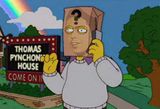Thomas Pynchon

“Let me be unambiguous. I prefer Thomas Pynchon.”
– Noel Coward on Thomas Pynchon
“American sailor writers aren't worth the salt they've dehydrated on.”
– Noel Coward on Thomas Pynchon
“ I carried around a copy of Gravity's Rainbow for six-months, it was the most blissful period of my adolescence; not once was I in want for toilet-paper. ”
– Oscar Wilde on Thomas Pynchon
Thomas Pynchon is an American writer, as well as a running gag in American intellectual life, based in the Quaternions whose dense and impenetrable canon of books signals the end of everything that is good or legible in American fiction. Pynchon is also commonly agreed upon as the #1 name dropped by assholes attempting to look brainy. Born in 1937, he served his country during World War II by firing v-2 rockets out of his infant penis.
Along with V. and The Taking of Pelham 123, Pynchon has written a few other books until distracted whilst thinking about the second law of thermodynamics. He leaves behind a cat and a small sturdy leather case large enough to contain a notepad, pencil and pen.
Thomas Pynchon is a complex, prestigious writer. Also, he's fucking batshit insane.
Pynchon's Work[edit | edit source]
Pre-Gravity's Rainbow[edit | edit source]
Before the 1973 release of Gravity's Rainbow catapulted Pynchon into the depraved world of drug abuse and sex parties that is synonymous with Bestselling Writers, Pynchon spent several years freelance writing for different literary magazines. His early writing credits include The New York Review of Dust Mites and Sentence Structure :Whats' The Point?.
Then, in 1963, while working as a guest editor for Unwieldy Magazine, Pynchon stumbled upon a book which he had heard of only as a rumor: Vladomir Nabokov's Humbert Humbert: Lockdown In Oz The book set Pynchon's mind aflame as he saw new possibilities for the direction of modern fiction.
Of course, it wouldn't be for another two decades that Pynchon would realize that the book was not actually a lost Nabokov book, but rather a random collection of words and definitions cut & pasted from the American Heritage Dictionary. Regardless, the work continues to influence Pynchon in his writing, as well a majority of Uncyclopedia editors.
Gravity's Rainbow[edit | edit source]
The New York Literary Scene in 1973 was worse than it had ever been in recorded history. Still reeling from the releases of Johnathan Livingston Seagull , there was little for them to wile away the time (debating the proper pronunciation of Jean-Paul Sartre and many were retreating from the scene, or worse - getting interested in film. A storm cloud was gathering over the ruined landscape of literature. Then a 760 page mess came across the sky.
Response to Gravity's Rainbow was better than anyone expected, and for decades, the book was lauded (loudly) as "a gorgeous shift in paradigm" in coffee shops across the nation. White people who wear African dresses praised the book as "the zenith of autodidacticism" while simultaneously browsing the A section of their dictionaries. Indeed, Gravity's Rainbow was the most beloved never-finished book since Leo Tolstoy's 1897 epic; C'mon, Fuckers! See How Far You Get In This One!, and a new verb, "Pynch" (meaning: "to add several paragraphs of awfulness", ex: "Oh snap! My College thesis has been pynched!) was added to the American Lexicon. It was indeed a great day for Thomas Pynchon, and coincidentally a terrible day for every writer who was not Thomas Pynchon.
The New York Review of Books promptly asserted that "American Fiction had yet to be created until Gravity's Rainbow was published." Even though these words first appeared in print, Pynchon's opus was putting readers all over the English-speaking world into a coma.
Post-Gravity's Rainbow[edit | edit source]
Following the success of Gravity's Rainbow, Pynchon set about his never ending struggle: More of the same, but longer. His 1990 release, Vineland was a miserable failure , which contained only a reasonable 385 pages, but the books inane and incessant pop-culture references make up in crap for what it lacks in weight. His most recent novel, Against The Day, weighing in at 1,085 of pseudomathematics, is considered his finest work to date.
Works[edit | edit source]
- V.
- The History Of The World Before Gravity's Rainbow (pt. 1)
- Gravity's Rainbow
- The People's Future of The World After Gravity's Rainbow (Vol. IV-VI)
- Naughty Deadwood: A Compendium of E.B. Farnum/Richarson Slash
- The Taking Of Pelham 123
- Deconstructivist Fiction For Dummies
- Mason & the Other Guy
- Against the Day
- Incoherent Overwritten Literary Trainwreck
- ConAir
Public Appearances[edit | edit source]
Notoriously withdrawn, Pynchon may be more famous in the role "reclusive author" than his initial role "bad author". Following is a list of Pynchon's public appearances to date:
- Sesame Street: August 14th, 2001. Pynchon (wearing his classic monacle and ascot) teaches children the number (x=(e/√r) * (πr2) ≠x) and letter (Oompa Loompas) of the day.
- The Simpsons: March 12th, 1999. Pynchon (wearing his classic brown derby and Dame Edna glasses) appears as the character Homer Simpson
- Firefly: November 11th, 2002. In a humorous cameo, Pynchon (wearing his classic ten-gallon hat and spurs) swears in Chinese when main character Chuck Supercool asks the question "Who wrote this drivel!?"
- Macy's Thanksgiving Day Parade: November 24th, 2005 Pynchon (wearing his classic giant M&M costume) is the M&M balloon.
- Tony Clifton Atonal and occasionally comedic Los Angeles lounge singer, is actually Thomas Pynchon (wearing his classic moustache and fat-suit).
External links[edit | edit source]
The following link is reported to be true, and yet is an estimated 7,000 times funnier than what I just did on the subject. Origins: "Whip It", by DEVO
